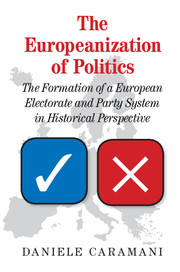 The Europeanization of Politics
The Europeanization of Politics Preface and Acknowledgements
Published online by Cambridge University Press: 05 November 2015
Summary
In 2004 The Nationalization of Politics was published, a book on the formation of national electorates and party systems from the 19th century until the present time. In concluding that study I hinted at one possible, natural continuation of that line of work – namely, the analysis of the incipient supra-national integration and formation in Europe of electorates and party systems; their “Europeanization” as it were.
The present volume is a step in that direction. One of the lessons, perhaps the main one, from the nationalization study was that – within the boundaries of the nation-state, the most important political unit over the past two centuries – politics transformed from territorial to functional, with non-territorial dimensions of contestation (first and foremost the left–right class cleavage) overwhelming and replacing territorial ones. With the blurring of national boundaries through European integration, the question is whether today “nationalization at the European level” is taking place along the same lines of nation-states at an earlier stage of political development. Research for this volume, however, soon showed that, rather than “incipient”, electorates and party systems have long been “Europeanized”.
This study thus investigates in a long-term and historical perspective the extent to which electoral politics (voting behaviour, party systems, ideological families) transforms from national, that is centred on national-territorial specificities, to European, with alignments cutting across national units. Similarly to the work on the nationalization of politics, it is an analysis of democratic integration. Europeanization is operationalized as homogeneity among nation-states in Europe and uniform, simultaneous electoral shifts. Further, it is defined in terms of ideological cohesion among parties of the same family across Europe and of vertical correspondence between national and European electoral arenas. Also similarly to the work on nationalization, this study challenges the conventional view that such integration began after World War II. It shows, on the contrary, that the Europeanization of electoral politics is a much longer process, starting in the 19th century, and that a European electorate has long existed and manifested itself through common and simultaneous “waves” of change across the continent – both Western and Central-Eastern Europe.
- Type
- Chapter
- Information
- The Europeanization of PoliticsThe Formation of a European Electorate and Party System in Historical Perspective, pp. xiii - xivPublisher: Cambridge University PressPrint publication year: 2015
